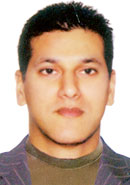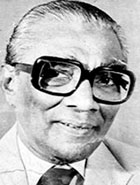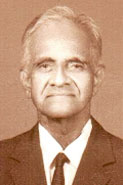Joseph Nalin Swaris, an intellectual, historian and critic of art and politics passed away while on a tour of China on April 16. Like his two older brothers Ranjit and Lakshman, Nalin was educated at St. Benedict's College. Soon after finishing his Senior School Examinations he decided to join the priesthood - the Redemptorist Order, studying at St. Alphonsus College, Bangalore, India. After his ordination, he returned to Sri Lanka. He preached in several missions and became a popular figure, because of his outspoken ideas making his sermons interesting.
As one of his friends Quintus Perera pointed out recently Nalin gave up the priesthood and went to the Netherlands in 1969 where he obtained a Master's Degree in the Social Sciences in 1973. He taught Social philosophy and methodology of Community Development at the Senior College for Social Work, De Horst in Driebergen for 17 years. He obtained a Master's Degree cum laude in Religions from the Catholic University of Nijmegen.
In 1990 he began studying the social dimension of the Buddha's Teaching and the study led him to obtain a PhD cum laude for his dissertation Magga, the Buddha's Way to Human Liberation - A Social Historical Approach, by the State University of Utrecht in 2997. Besides teaching, lately he was also involved in human rights activities.
After his retirement from teaching, he was heavily involved in human rights and visited several countries addressing conferences involving these issues. Many of these articles appeared in Dutch newspapers and magazines. He became very fluent in Dutch. Nalin visited Sri Lanka every year for a few months. This year he decided to visit China and his life suddenly came to an end.
LAS,
Florida, USA
| You touched our lives with sincere warmth |
| Uncle Nalin |
Though I write in tribute
to you, I know
I write for myself.
For my words
will not penetrate
death’s stillness
nor touch your heart
which has suddenly stopped beating.
No matter, I write anyway,
for there is a need in me to do so.
Even if it is only to put on record
that you were family
that you lived, loved, and were loved
that in spite of your fine mind
and rare intellect,
in spite of the philosophy, the theology, and
your stand for Rights
you will best be remembered
by those who were closest to you,
for your wit and humour,
the laughter that punctuated- even dominated
every conversation
The laughter which now
recedes to memory
I write to say out loud
though you will not hear me anymore
that you carried with yourself
your own brand of joy
and touched- even filled
our lives
with a sincere warmth
I can only hope
you knew
you were held in that same affection.
Hasitha Wickremasinghe |
If love alone could have saved you
Ondray Ephraums
Brother Ondray, we speak your name
With love and pride;
A thousand times we needed you
A thousand times we cried;
If love alone could have saved you,
You would never have died.
We smile through tears we try to hide
“Thank you”, Brother, for the times we shared,
And the way you cared;
It broke our hearts to lose you,
But you did not go alone –
A part of us went with you
The day God called you home.
Our angel baby brother, it is one year since you were called to eternal rest, on May 14, 2010.You are fondly remembered by your ever-loving sisters Hermoine, Linda and Helen, brothers-in-law Ranjan, Brian, Roger and the rest of our families, here and abroad.
Hermoine
He transcended linguistic, ethnic and religious differences
M.A. Bakeer Markar
As one who represented the Kalutara District in Parliament I am honoured to pay tribute to M.A. Bakeer Markar on his 14th death anniversary.
Alhough I did not have the good fortune of serving together with him in Parliament I got to know him quite well through his son and my friend Imthiaz Bakeer Markar who also served the country as a Parliamentarian and a Cabinet Minister.
Bakeer Markar was born on May 12, 1917 in Beruwela. His father Hakeem Alia Marikar Mohamed Marikar belonged to a family of physicians with an ancestry traced to Sheikh Jamaluddeen Al-Maghdoomi, a pioneer Arab settler in Beruwela. Mr. Bakeer Markar was educated at Zahira College, Colombo where he came under the influence of the great educationist Dr. T.B. Jayah. At school he was an able orator with a good command of not only Tamil but Sinhala and English as well.
Mr. Markar entered the Ceylon Law College in 1942 but had to wait until 1947 to qualify as a proctor due to the intervention of World War II.
During the war he joined the Civil Defence Services and was sent to Hyderabad India for specialized training. During this period he also served his alma mater as a teacher for a short time.
At the 1947 general election he played a leading role in the campaign of Dr. Jayah in Colombo Central. Thereafter he became a supporter of the UNP.
Mr Markar first entered politics in 1950 when he was elected uncontested as a member of the Beruwela Urban Council. In the first year itself he became the Chairman of the Council.
In March 1960, he contested the Beruwala electorate and was elected to Parliament. However, he was not successful in the July general election the same year. He won the seat in 1965, lost it in 1970 and won it again in 1977 with a thumping majority.
He became the Deputy Speaker of Parliament in August 1977 and within a short time was elected as Speaker. He held this position with dignity and distinction until August 1983, when he was appointed a Cabinet Minister. In June 1988 he resigned from Parliament to serve as the Southern Province’s first governor. He held this position until December 1993.
A singular honour befell him when he was the Speaker. As the then President J.R. Jayewardene and the Prime Minister R. Premadasa had to attend the wedding of Prince Charles and Diana Spencer, Mr. Markar being the next in line was called upon to act for the Head of State. This is the only instance since the 1978 constitution was promulgated that a person other than the Prime Minister was bestowed this honour.
He represented Sri Lanka at the funeral of Egyptian President Anwar Sadat in 1981. He was also awarded the Distinguished Order of Merit by the President of South Korea in 1992.
He was one of the many who worked hard to make Sinhala an official language. At a joint conference of delegates from the All-Ceylon Muslim League and the All-Ceylon Moors’ Association held in 1955 he sponsored a resolution to make Sinhala an official language and succeeded in persuading the conference to adopt it unanimously.
A firm believer in unity in diversity, he had the ability to transcend linguistic, ethnic and religious divides. Though he was a Muslim leader, he was able to earn the goodwill and respect of all communities.
Mr. Markar espoused the cause of national unity with all resources at his disposal. It is heartening to note that his son Imthiaz is continuing the good work started by his father through the Bakeer Markar Centre for National Unity.
He led a full life, serving his religion, people and the country. He died 14 years ago at the age of 80. A man of great character adorned with simplicity and sincerity he endeared himself to all those who had the privilege of associating with him.
May his legacy continue to inspire generations of Sri Lankans. to come.
Tilak Karunaratne
Never thought Daddy would leave us so soon
Dr. Derrick Oswald Nicolle
In memory of my beloved father
It’s been ten long years since you bid me good-bye,
It seems like yesterday;
I find it difficult to forgive myself for not kissing you good-bye,
I never thought you would leave so soon;
Daddy, you were in such good health, but answered God’s call
For your valuable service in God’s Heavenly Kingdom;
There’s not a day that passes that I do not shed a tear for you,
So darling Daddy, I will love you till I meet you some day,
In God’s Beautiful Paradise.
Hazel Anne Nicolle Seneviratne
Only his genius for making things work would have revived an ailing giant like the CWE
Dharni Chandragupta Wijesekera
The last post has sounded, and grief-stricken colleagues and fellow professionals bend their heads in respectful tribute. DCW, chartered accountant “par excellence” and past president, The Institute of Chartered Accountants of Sri Lanka (ICASL), who bestrode the profession like a colossus, has crossed the great divide.
His voice is permanently stilled. A sense of great loss hangs heavy over the profession. It is no easy task to catalogue the multifaceted contributions DCW made to the profession in particular, and the country in general.
DCW’s initial baptism as a chartered accountant was at Shell Company, where he was soon recognised for being an innovative and committed officer. Following the oil company’s takeover, he set up a consultancy firm, Associate Management Services. He was among the first chartered accountants here to introduce information technology as a tool in consultancy practice.
In a short time, Associated Management Services became one of the country’s most sought after consultancy outfits, receiving a steady flow of World Bank and Asian Development Bank assignments. DCW had found his dream career in management consultancy, which took him on a meteoric trajectory. In 1980, DCW reached an agreement with Coopers and Lybrand, UK, where he had had his training two-and-a-half decades earlier.
The result was Coopers and Lybrand, a firm of chartered accountants in Sri Lanka. Devasiri Rodrigo, who had worked at Coopers and Lybrand, joined DCW as a partner. Mr. Rodrigo had the responsibility of building up an audit practice, while Mr. Wijesekera continued his consultancy practice as the precedent partner.
When Pricewaterhouse and Coopers Lybrand merged internationally, the two local firms merged as PricewaterhouseCoopers. Many who received their training under Mr. Wijesekera continue to hold him in awe and refer to him with respect and gratitude. Under his able guidance, PricewaterhouseCoopers rose to be one of the “top three” practising firms in Sri Lanka. Mr. Wijesekera retired from PricewaterhouseCoopers in September 1992, on reaching the age of mandatory retirement.
DCW’s expertise was then sought by the Government, to strengthen the expanding state corporate sector. He was on the committee appointed by the Minister of Finance to review capital structure and the management organisation of corporations.
DCW played a lead role in re-structuring key corporations and strengthening their accounting and management systems. Subsequently, the Government called upon him to shoulder more responsibilities – as a director at Air Lanka, the State Fertiliser Manufacturing Corporation, and the Ceylon Fisheries Harbours Corporation. Deficiencies in these organisations were speedily rectified. DCW successfully dealt with the symptoms and the ills; those were what mattered to him; the causes were of no interest to him.
Perhaps his biggest challenge came when Lalith Athulathmudali appointed him as chairman of the Co-operative Wholesale Establishment (CWE). Here was an ailing giant, crippled by inefficiency and running at a huge loss. DCW accepted the post at a time when public sector business disasters were depressingly rampant. In just a few years, DCW transformed the CWE into a profit-making entity, meeting the country’s basic consumer needs and selling at a fair price.
DCW never saw a state sector organisation as dysfunctional; if properly managed, it would work. That was his motto. This he demonstrated when he pulled the corporate behemoth, the CWE, out of the mess it was in.
DCW had a strong, confident personality. He was totally focused on the tasks at hand, and knew exactly what course of action to follow. As a leader, he was respected for his foresight and organisational competence. He never compromised on his principles. But he was always ready to listen to a contrary viewpoint and evaluate it on its merits.
DCWs’ contribution was not limited to the corporate world. Although first and foremost a professional accountant, he was happy to advise when approached by other professions and academe. He was sought by the medical and engineering sectors, and was on the board of the Postgraduate Institute of Medicine and the council of the University of Moratuwa.
DCW’s contribution to his own profession was outstanding. At the Institute of Chartered Accountants’ inception in 1960, he was appointed a member of the examinations committee. In 1968, he was appointed a member of the council of the Institute, serving on several committees. In 1978, he was elected president of the Institute of Chartered Accountants, a position he held until the end of 1981.
Advancing age did not mellow or slow down DCW. His quest to expand and update his knowledge continued unabated. Often, he visited the ICASL members’ lounge to read The Wall Street Journal.
In September last year, I accosted him as he was hurrying along Bullers’ Lane. He held in his hand a book with a blue cover. It was “Blue Ocean Strategy”, the book that had taken the management world by storm, challenging the conventional foundations of strategic success.
“Lal, read this book,” he told me. “It is a masterpiece. But remember that contrary to what the book suggests, there are no separate blue and red oceans in the business world. There is only one big ocean, where blue and red currents crisscross all the time.”
That was typical of DCW’s skeptical, analytical style, which informed the range, depth and quality of his knowledge.
On occasion, DCW’s cavalier, no-nonsense style could be provocative. He would sometimes lose his temper, and this would alienate the more conservative-minded. Subordinates and colleagues were also occasionally at the receiving end of his verbal onslaughts.
DCW, the stubborn, dictatorial boss in the office, was full of charming banter outside the office, and the “boss” continued to command respect and affection. He was more intent on solving problems than following rules; while this may have drawn criticism from some, it earned the respect of others.
DCW deserves all the encomiums and plaudits he gets for an outstanding performance. His résumé is impressive and weighty. He chose not to follow the beaten track, but the path strewn with challenges. His pragmatic approach and perseverance brought him fame and success. He illuminated the accountancy profession for more than five decades. A beautiful innings has come to an end.
DCW’s philosophy can be summed up in lines from W. E. Henley’s celebrated poem, “Invictus”:
“It matters not how strait the gate,
How charged with punishments the scroll,
I am the master of my fate,
I am the captain of my soul.”
Lal Nanayakkara
|




